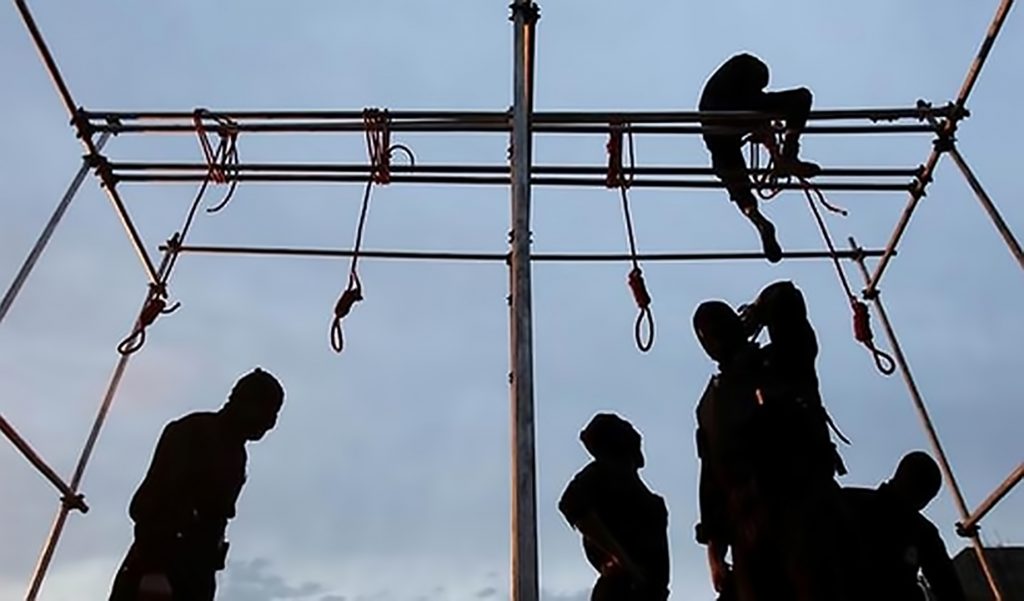London- A Gulf-prepared paper exposed earth-shattering statistics on the systematic executions carried out in Iran since the rise of the cleric regime in 1979.
Iran’s theocratic regime, founded by Ruhollah Khomeini, has long enforced law through the brutal excess of capital punishment served to a poor and oppressed public. The cleric-led regime thrived as it offsets leftist activists and mindsets with the death penalty.
The Arabian Gulf Center for Iranian Studies published paper suggests that the ongoing vicious circle of 37 years’ worth of executions had spawned along with the so-called Islamic revolution that overthrew the Pahlavi dynasty.
Most of the documented death penalties have been served to political activists and any opposition that attempts to rise against the regime—capital punishment is being handed out in Iran on the account of charges on fighting Islamic rule, conspiring against national security and corruption. Allegations are chiefly framed against any political opposition.
As the odds play out in a better favor of Rouhani being elected for a second term, the study expected that the policy on death penalty with continue worsening the current standing of oppression in Iran.
Policymaking in Iran is not within the president’s jurisdiction but remains a power saved for the national Supreme Leader, Ali Khamenei. The pro-Shi’ite hardline system will resume death sentences in an intensifying fashion against Sunni citizens, overlooking international and local protests and condemnations.
The study prepared by Dr. Abdel Raouf Mostafa Jalal Hassan says that the political mechanism running Iran is self-sustaining at any cost, censorship, arbitrary arrests and executions all are systematic policies used to nourish and uphold the instated theocracy.
The only justification put forth by the regime is that the inhumane policy of self-sustenance is implemented to counteract the efforts of pro-imperialism moles attempting to infiltrate the Iran system—even though it is acknowledged that the West powers (Iran-labeled imperialist) had greatly aided the Khomeini 1979 revolution to its power grab and toppling of Mohammad Reza Shah Pahlavi.
As the Khomeini-founded regime further bolstered its institutional position in the 80’s, the second phase of targeting and zeroing in on any opposition launched with waves of deportation, executions and detentions against activists.
Among the groups oppressed by the Iran regime for holding a different belief system or ideology, are the People’s Mujahedin of Iran, the Arab people of Ahwaz and the people of Baluchistan, Kurds and those who are believers in the Bahá’í Faith.
In 1988, Khomeini issued a fatwa, a ruling on a point of Islamic law given by a recognized authority, which endorsed all death sentences against People’s Mujahedin of Iran (also known as the MEK) activists.
Issued shortly after the end of the Iran-Iraq war in July 1988 and an incursion into western Iran by the Iranian resistance, the fatwa reads: “It is decreed that those who are in prisons throughout the country and remain steadfast in their support for the Monafeqin (Mojahedin) are waging war on God and are condemned to execution.”
Children as young as 13 were hanged from cranes, six at a time, in a barbaric two-month purge of Iran’s prisons on the direct orders of Ayatollah Khomeini.
More than 30,000 political prisoners were executed in the 1988 massacre – a far larger number than previously suspected. Secret documents smuggled out of Iran reveal that, because of the large numbers of necks to be broken, prisoners were loaded onto forklift trucks in groups of six and hanged from cranes in half-hourly intervals.
Most of the MEK hanged activists were accused of conspiring with Iraq’s Saddam Hussein in the Iran–Iraq war, and their separatists aspirations.
Iran Human Rights Organization reported 56 executions in different Iranian cities happening in a time frame as short as three weeks at a time. According to the organization, 17 prisoners in Wakil Abad prison in Mashhad were executed on September 13 for drugs accusations, 3 in Adel Abad prison in Shiraz city, 2 for burglary and assault accusations, and another prisoner was executed in public.
More so, The Guardian News Agency reported that the Iranian authorities executed three Turkish nationals for drug trafficking last year only 11 days after a high-profile visit to Tehran by Turkey’s president, Recep Tayyip Erdogan.
The family of a 46-year-old man, Faruk Güner, a father of nine children, confirmed to the Guardian that he was executed. He was a lorry driver working between Afghanistan and Turkey who passed through Iran. “We tried for four years to save him. They didn’t tell us that he was going to be executed. They hanged him in the morning; we got the news in the afternoon,” Güner’s brother said.
Güner’s brother said his family’s pleas to Iranian authorities fell on deaf ears. “We asked help from many places; nobody helped us,” he told the Guardian via telephone. “We found a lawyer and we went to Iran; we tried to prove that he was innocent, but one day they just executed him. This is inhuman. He had nine kids.”
